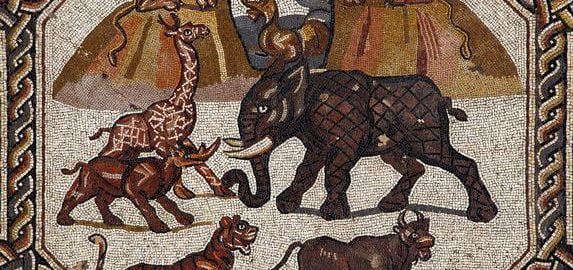The performances of wild animals in the Roman arenas certainly aroused excitement in the viewers. Roman politicians were able to het support from the crowds by bringing huge amounts of animals, which then offered entertainment to the crowds. We know many stories and ways to create a spectacle. Some of them were really inhuman.
According to the Roman speaker and philosopher Cicero, a certain lion in the arena killed nearly 200 opponents before being finally slaughtered. In turn, we know another story saying that a group of 18 elephants in the course of an escape was trampling a crowd of people. In principle, the hunters (bestiarii), armed with bows and javelins, had to fight with animals. Unexpectedly, however, elephants forced the fence separating the arena from spectators. To avoid similar events in the future, it was decided to strengthen the protective barriers.
Turning to the subject of warriors fighting with wild animals, it is worth mentioning the most famous beast slayer who volunteered in the arena (so-called venatores). It was called Carpophorus, who supposedly killed 20 animals on one day, and strangled some of them with his own hands. In addition to killing, Carpophorus was also involved in animal training. Apparently, he tried to encourage the male giraffe to rape a woman. For this purpose he collected from females in the phase of pre-emptive pheromones, which then sprinkled on slaves or homeless women. According to reports, Carpophorus used a few women to train a giraffe before the show.
Another idea to make the show more attractive survived thanks to Martialis. In his Liber spectaculorum he mentions that the opening of the Colosseum was graced by a series of bloody mythological scenes. In one of them, a woman immobilized in a wooden cow was forced to mate with a bull. She played the role of Queen Pasiphaë, who gave birth to the monstrous Minotaur.
Another way to warm up the emotions was to recreate the popular myth. Such was the myth of Orpheus, a musician who had such great skills that his music could relieve the roaring waves of the sea and make the trees lean towards the singer, and the wild beasts followed him as gentle as lambs. The Romans loved this legend and tried to play it many times. For this purpose, even changing the convict for Orpheus, they provided him with a lire, and then let them out into the arena full of angry bears, who were previously starved and beaten.
However, what is worth emphasizing brought beasts from the whole known world, did not have to end their lives in amphitheater arenas. As it turns out, the Romans did not always demand death of beautiful and dangerous animals. They definitely preferred to admire them in their lifetime. For this purpose, for example, crocodiles were released, which in the prepared ditches of water rested and aroused admiration of the viewers. Another time, the audience was happy to see a group of leopards running in a line. The elephants, in turn, were so well-trained that they performed various tricks and danced in the arena.
Finally, it is worth mentioning that bringing from the whole known world mass of animals caused that some of the animal species were significantly wiped out or disappeared from the given areas. Northern Africa and the Mediterranean area suffered the most. For example, after the Games, in which nearly 9,000 animals died, hippos disappeared from the Nile. In turn, the so-called the African forest elephant, used even in the army of Carthage, disappeared completely from North Africa and is currently located only in central Africa.







